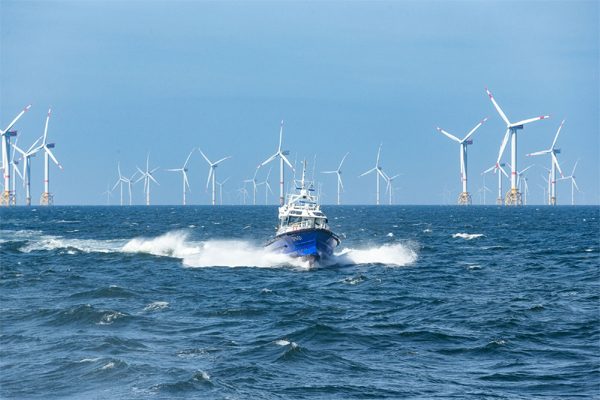
By Andreas Kluth
“Her cheek was wet with North Sea spray,We walked where tide and shingle meet;The long waves rolled from far away,To purr in ripples at our feet.”
Arthur Conan Doyle obviously caught the North Sea in optimal weather on that particular day. But as the briny made him surge with love, it should now make us giddy about its wind.
That’s because the place — I’ve vacationed there — is awfully gusty. I mean that in the best way. For Europeans now intend to harvest that energy in earnest, to become green in the long run and independent from Russian fossil fuels in the short. Because four countries in the European Union are joining in the effort, they’ll also set an example that could inspire similar approaches elsewhere.
The quest’s captain, if there is one, is Danish Prime Minister Mette Frederiksen. This week, she hosted leaders from Germany, Belgium and the Netherlands on the Jutish coast to launch a huge common effort to dot the North Sea with wind turbines, manmade “energy islands,” and interconnected transnational grids below.
The goal is to capture 10 times more energy than at present within two decades, and ever more thereafter. The North Sea, Frederiksen said, will become the “green power plant for the entire European Union.” Its wind will directly generate electricity for many millions of consumers and businesses, as well the green (meaning clean) hydrogen that will replace natural gas and other fuels wherever electrification isn’t feasible.
Also present was Ursula von der Leyen, president of the European Commission, who dropped in from Brussels just after presenting the European Union’s latest energy package, called REPowerEU. It’s meant to be the bloc’s overall blueprint to meet the twin goals of becoming both green and free of Russian President Vladimir Putin’s hydrocarbons.
That EU bundle, as usual, is a laundry list of worthy technocratic goals. New buildings are to have solar panels on their roofs; permissions for new renewable energy projects are to accelerate dramatically; that sort of thing. Let’s see if member states play along.
As for the near-term goal of phasing out Russian energy imports, REPowerEU of course emphasizes replacing as much as possible of Moscow’s pipeline gas with the liquefied natural sort (LNG) that comes by ship. For that, Europe will look not only to big suppliers such as the US and Qatar, but also to countries such as Nigeria, Senegal and Angola.
Even so, LNG can substitute for only about a third of what’s coming from Russia now. Europe needs new energy sources that are ideally clean as well.
That’s why this new North Sea “coalition,” as Belgian Prime Minister Alexander De Croo called it, is such a great idea. The North Sea is huge, blustery, and near lots of population and industrial centers. But so far, the countries around it have taken a largely national approach to using its wind.
The clear leader in terms of wattage is the UK. Sadly, it’s no longer in the EU. Even so, it recently linked its capacity to Norway, also not an EU member, with the world’s longest underwater interconnector cable.
But the holy grail is what the four countries convened by Denmark’s Frederiksen are trying to do. It’s to plan all these offshore “wind parks” — which are coming closer to one another anyway — as one integrated grid, linked to the rest of Europe. That’s the way to make European energy markets both efficient and resilient.
“The gray below, the gold above,” Doyle enthused as he looked at the sea; “For so the grayest life may shine, all golden in the light of love.” The North Sea may not sweep you away in quite the same way. But I’m sure we can agree that our relationship with it will be tempestuous.
___________________________________________________
Andreas Kluth is a Bloomberg Opinion columnist covering European politics. A former editor in chief of Handelsblatt Global and a writer for the Economist, he is author of “Hannibal and Me.” Energiesnet.com does not necessarily share these views.
Editor’s Note: This article was originally published by Bloomberg, on May 23, 2022. All comments posted and published on EnergiesNet.com, do not reflect either for or against the opinion expressed in the comment as an endorsement of EnergiesNet.com or Petroleumworld.
Use Notice: This site contains copyrighted material the use of which has not always been specifically authorized by the copyright owner. We are making such material available in our efforts to advance understanding of issues of environmental and humanitarian significance. We believe this constitutes a ‘fair use’ of any such copyrighted material as provided for in section 107 of the US Copyright Law. In accordance with Title 17 U.S.C. Section 107. For more information go to: http://www.law.cornell.edu/uscode/17/107.shtml.
energiesnet.com 05 25 20022







